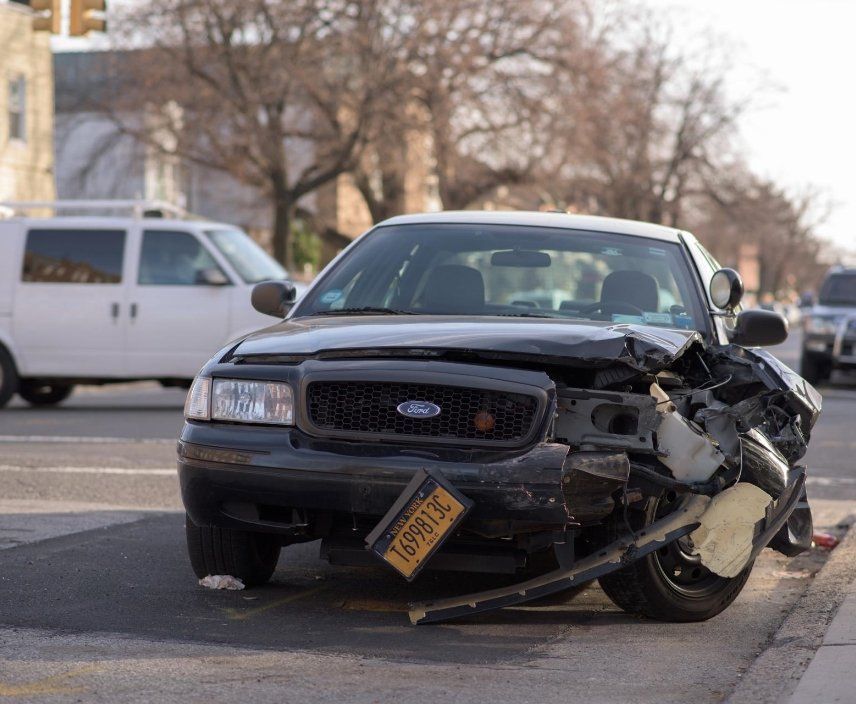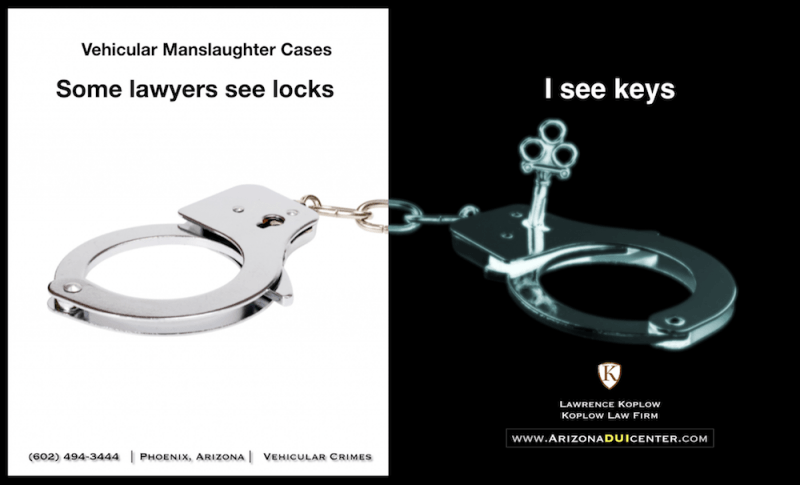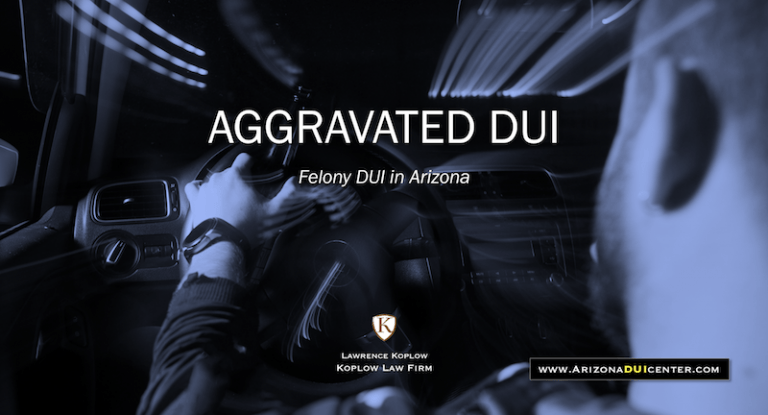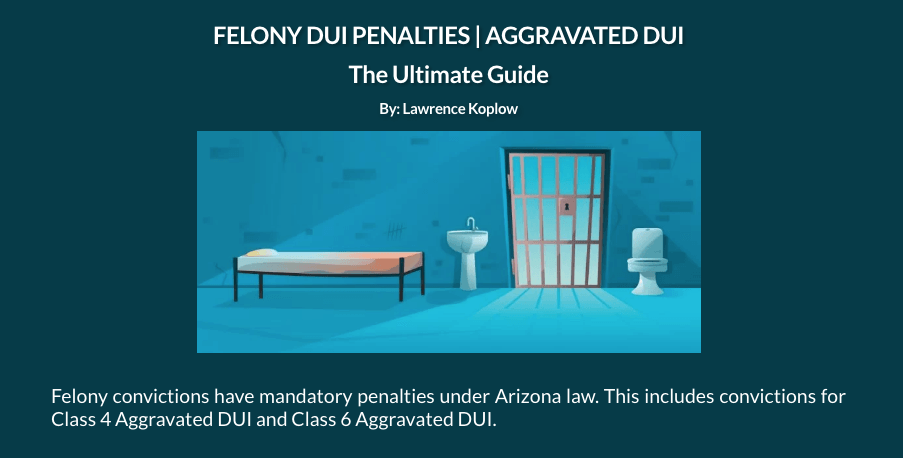Vehicular Homicide in Phoenix, Scottsdale AZ
KOPLOW LAW FIRM- VEHICULAR CRIME & DUI SPECIALISTS IN PHOENIX AZ
Vehicular homicide refers to the category of Arizona crimes where a person was killed during a car accident. Commonly these kinds of accident involve the use of alcohol, drugs or prescriptions medications. There are also some vehicular homicide cases where impairment is not a factor. These case usually involve an allegation of extremely excessive speed violations.
Ready to Fix This?
Vehicular Manslaughter in Phoenix, AZ
Manslaughter requires the government to prove that the person recklessly caused the death of another person. See § 13-1103. These cases are frequently DUI related homicides. Manslaughter is a class 2 felony.
Recklessly Cause Death: A person commits manslaughter if they recklessly causes the death of another person. The phrase manifesting extreme indifference to human life doesn’t add an additional culpable mental state but only requires an extreme form of recklessness that is greater than is required for manslaughter.
Extreme Indifference to Human Life: Whether or not such an “extreme indifference’ to human life exists is to be determined from all the facts and circumstances surrounding the vehicular homicide.”
Distracted Driving | Driving While Sleepy | Falling Asleep
Manslaughter Case Law
Unconsciousness is not separate affirmative defense to charge of manslaughter but is subsumed within the concept of “voluntary act,” which State must prove by statute. State v. Lindeken, 165 Ariz. 403, 799 P.2d 23 (App. 1990), review denied.
1. What is Vehicular Homicide?
Vehicular homicide is a more broad term that describes a vehicular crime that results in death. This includes vehicular manslaughter, but also negligent homicide.
2. Is Killing Someone in a Car Accident Manslaughter?
Not necessarily. There is a big different between a common car accident that result in death and vehicular homicide. Manslaughter requires both reckless behavior and an extreme indifference to human life.
3. Voluntary Manslaughter
A conviction for voluntary manslaughter requires evidence of an unlawful (unjustified) killing without malice (without the intent to kill), upon a sudden quarrel or heat of passion. State v. McIntyre 106 Ariz. 439, 477 P.2d 529 (1970).
4. Recklessness
The culpable mental state of recklessness is less than the intentional conduct required for an attempted manslaughter conviction. State v. Ruiz, 340 P.3d 396 (App. 2014).
5. Being Aware of the Risk
Reckless manslaughter involves being aware of a substantial and unjustifiable risk that one's conduct will cause another's death and consciously disregarding that risk. State v. Valenzuela 194 Ariz. 404, 984 P.2d 12 (1999).
6. Extreme Indifference
The culpable mental state of “extreme indifference” in context of crime of reckless second-degree murder is greater in degree of criminality than the culpable mental state involved in the crime of reckless manslaughter. State v. Walton, 133 Ariz. 282, 650 P.2d 1264 (App. 1982).
7. No Malice Required
Distinguishing characteristic between “murder” and “manslaughter” is that malice is not element of latter. Harding v. State, 26 Ariz. 334, 225 P. 482 (1924).
8. Must Be The Actual Cause | Cause-in-Fact | Proximate Cause
Defendant who was charged with manslaughter arising from automobile accident could be convicted only if jury found that her recklessness was both an actual cause, or cause-in-fact, and a proximate cause of victim's death. State v. Jansing, 186 Ariz. 63, 918 P.2d 1081 (App. 1996), review and cross review denied.
9. Unconsciousness
Unconsciousness is not separate affirmative defense to charge of manslaughter but is subsumed within concept of “voluntary act,” which State must prove by statute. State v. Lindeken, 165 Ariz. 403 (App. 1990), review denied.
10. Is Involuntary Manslaughter a Felony?
Manslaughter in Arizona is a Class 2 felony.
11. Superseding Causes
An intervening event is a superseding cause constituting a legal excuse only if unforeseeable and, with benefit of hindsight, abnormal or extraordinary.
12. Design Defect
Exclusion of evidence of possible design defect from placement of gasoline tank in victim's truck was proper, in prosecution for manslaughter, even though defendant claimed defect was superseding cause of fire and victim's death, as defendant accepted risk that she might hit another vehicle and kill the occupants when she chose to drive while intoxicated and not stop at stop sign, and it was neither unforeseeable nor abnormal that cause of death would be a collision-related fire. State v. Jansing, 186 Ariz. 63, 918 P.2d 1081, (App. 1996), review and cross review denied.
Second-Degree Murder
The difference between second-degree murder and manslaughter is the degree of “recklessness” that is attributable to a person’s conduct. On one hand, a person commits second-degree murder if “[u]nder circumstances manifesting extreme indifference to human life, the person recklessly engages in conduct that creates a grave risk of death and thereby causes the death of another person.”
Negligent Homicide
A person commits negligent homicide in Arizona if:
- With criminal negligence
- The person causes the death of another person. A.R.S. § 13-1102.
Criminal negligence is, with respect to the circumstances or result of an offense, the failure to “perceive a substantial and unjustifiable risk that the result will occur or that the circumstance exists.
The risk must be of such a nature and degree that the failure to perceive it constitutes a gross deviation from the standard of care that a reasonable person would observe in the situation.” A.R.S. § 13-105(9)(d).
Arizona Vehicular Manslaughter FAQS
- What is the difference between vehicular manslaughter and vehicular homicide in Arizona?
Coming soon.
- What is the difference vehicular manslaughter and second-degree murder in Arizona?
Coming soon.
- What is negligent homicide in Arizona?
Coming soon.
- Does Arizona have different statutes for vehicular homicides and other types of homicides?
Coming soon.
- Who can be the victim in Arizona vehicular manslaughter cases?
Arizona calls the deceased in vehicular crimes a “victim.” Under Arizona law a victim can be the driver of another car, a passenger in another car, a passenger in your car, a bicycle rider or a pedestrian.
- What if the person who died was not wearing their seatbelt?
Coming soon.
- How are Arizona’s vehicular manslaughter laws unique?
No two states have the exact same vehicular homicide laws. Arizona does not distinguish vehicular deaths from other types of manslaughter cases.
- What are the defense to vehicular homicides allegations in Arizona?
Coming soon.
- Can a vehicular homicide conviction be expunged?
Coming soon.
"Lawrence represents very high-profile clients who greatly depend on a good outcome, and this guy will deliver.
This is a prosecutor's worst nightmare, and it should be that way if you need an attorney."
- David E.
Real Client's Husband, Phoenix, AZ
Hiring a Vehicular Manslaughter Attorney in Phoenix, AZ
Arizona DUI law is extremely complicated and has severe consequences. DUI law is commonly referred to as a minefield. An attorney must be competent in the Arizona Rules of “Criminal” Procedure, the Arizona Rules of Evidence, the United States and Arizona Constitutions, and the Arizona Department of Motor Vehicles Rules and Regulations.
An attorney cannot do anything for you unless he or she has extensive experience in these areas. Police officers are only human and do commit legal errors. However, only an experienced DUI attorney will be able to find these errors and use them to help his or her client.
You should choose an experienced DUI attorney for the same reason you should choose a qualified doctor. If you break your wrist, you go to a doctor that specializes in wrist injuries. When you are charged with a DUI, you should hire a qualified DUI attorney.
An experienced Arizona DUI attorney can analyze your case for legal errors and defenses. He or she can have blood samples independently analyzed, look for suppression issues, review calibration / COBRA records of breath machines, find the right expert witnesses for your trial, and assist you with your driver’s license issues.
For more information, call our office at (602) 494-3444 or visit our contact page.
What Real People Are Saying
That is, DUI cases actually dismissed. Verifiable not guilty verdicts. Blood alcohol evidence truly suppressed as witnessed by judges, other lawyers, and newspapers.
Real Client's Husband, Phoenix, AZ
"Lawrence represents very high-profile clients who greatly depend on a good outcome, and this guy will deliver.
This is a prosecutors' worse nightmare, and it should be that way if you need an attorney."
- David E.
REAL CLIENT, PHOENIX, AZ
It was miracle!... A lot of people don't really understand the benefit of having an attorney who used to be a prosecutor. They know all the little tricks and scare tactics the state has as opposed to just hiring an attorney who is a little fish in a big pond."
- Joe C.
Contact Us Today!
For more information, call our office at (602) 494-3444 or fill out the form and we will get back to you.
Contact Us
We will get back to you as soon as possible.
Please try again later.
Arizona DUI Blog



DUI Library
The best DUI defense stuff that only a few know and none want to share. A one of a kind annotated resource for lawyers, people accused, or anyone who wants to see what’s going on in our justice system with DUI cases…and how to fix it.

Contact Information
Office Hours
- Mon - Fri
- -
- Sat - Sun
- Closed
What Happens After You Reach Out
A team member will begin reviewing your case.
We will contact you to ask questions and go over your options.
We will determine, together with you, what makes sense for the next step for you and your family to take.
Ready to Fix This?
Contact Us
We will get back to you as soon as possible.
Please try again later.
OUR SERVICES
QUICK LINKS
CONTACT US





